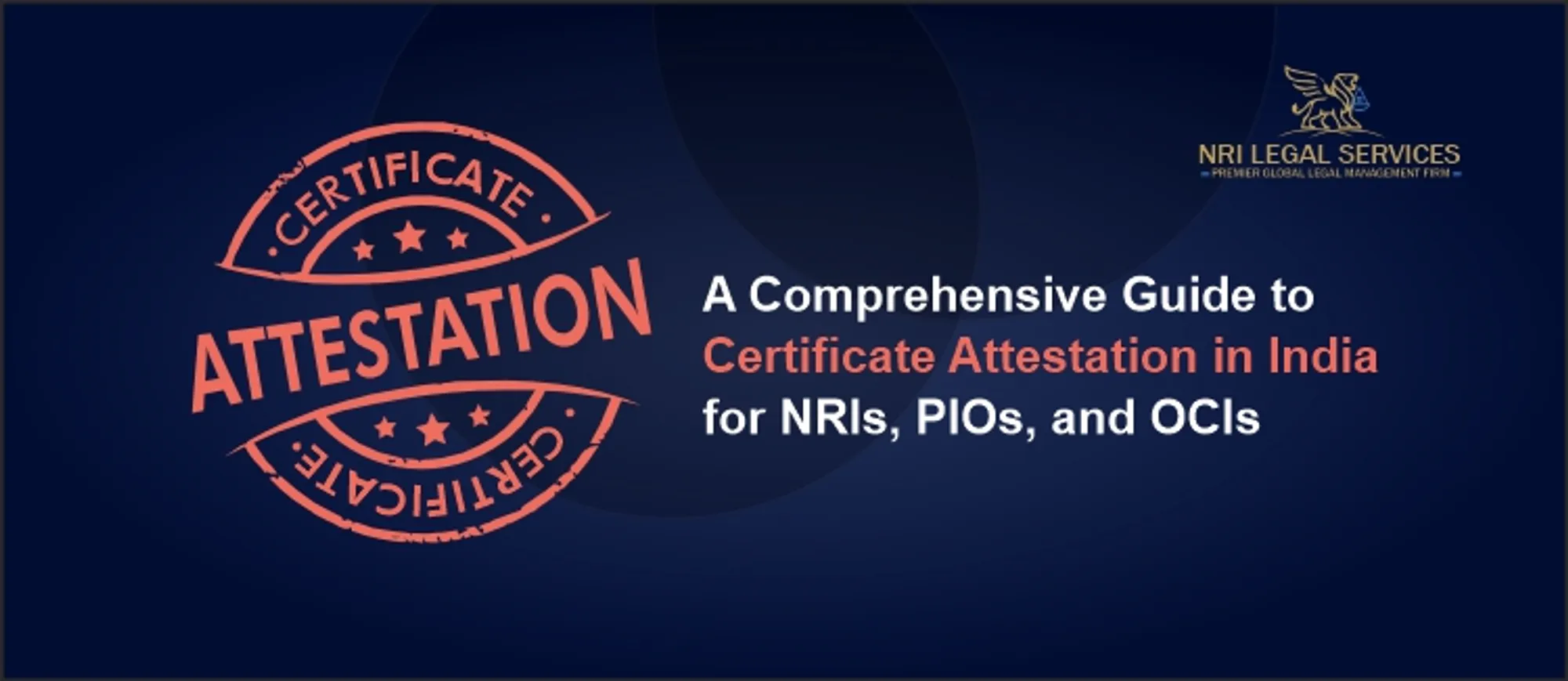Certificate attestation is a crucial process for Non-Resident Indians (NRIs), Persons of Indian Origin (PIOs), and Overseas Citizens of India (OCIs) who wish to use their educational or personal documents abroad. This article offers detailed insight into the certificate attestation procedure in India, outlining the steps involved for a smoother experience.
Table of Contents
Understanding who are NRI, OCI, and PIO
The Indian diaspora is widely dispersed, with individuals maintaining various connections to their homeland. Three crucial categories defining these connections are Non-Resident Indian (NRI), Person of Indian Origin (PIO), and Overseas Citizen of India (OCI).
NRI (Non-Resident Indian):
A Non-Resident Indian is an individual who retains Indian citizenship but resides outside the country. This status is typically acquired when living abroad for work, education, or other reasons. For instance, if you are an Indian citizen and receive a job promotion that requires you to relocate to Australia, you become an NRI. To qualify, an individual must possess an Indian passport and live outside India for at least 182 days or more during a financial year.
Must Read: NRI Property Disputes
PIO (Person of Indian Origin):
A PIO is a citizen of any country except Pakistan, Sri Lanka, Bangladesh, Bhutan, Nepal, China, and Afghanistan. This status is given to those born in India or with Indian citizen parents or grandparents. Additionally, being married to a spouse holding a PIO card qualifies an individual for PIO status. PIO status facilitates a strong connection between the individual and their Indian roots, allowing for certain privileges.
OCI (Overseas Citizen of India):
Being an overseas citizen of India offers something akin to dual citizenship. Unlike NRI and PIO, OCI is not contingent on the duration of stay outside India; it provides more comprehensive rights. OCI holders enjoy benefits such as multiple-entry lifelong visas, the ability to own property in India, and the right to work in various professions, except in specific government roles.
Understanding Certificate Attestation
Certificate attestation verifies the authenticity of personal and educational documents issued in one country for use in another. It is particularly significant for NRIs, PIOs, and OCIs who need their documents attested to meet the requirements of foreign employers, educational institutions, or government agencies.
Types of Documents for Attestation:
- Educational Documents: Includes degrees, diplomas, and certificates issued by educational institutions.
- Personal Documents: This includes birth certificates, marriage certificates, affidavits, agreements, and power of attorney.
- Commercial Documents: Includes business-related documents such as company registration certificates and commercial invoices.
Must Read: Common Landlord-Tenant Disputes
Step-by-Step Guide to Certificate Attestation:
Notary Attestation in India:
- Start by notarizing your documents at India’s local notary public office.
- The notary attestation confirms the authenticity of your signature on the document.
Home Department Attestation:
- After notary attestation, proceed to the State Home Department for further verification.
- The Home Department attestation is specific to each state and validates the document’s authenticity.
MEA (Ministry of External Affairs) Attestation:
- The next step involves attesting documents at India’s Ministry of External Affairs.
- MEA attestation is crucial as it certifies the document for use in foreign countries.
Must Read: NRI Demat Accounts and Regular Demat Accounts in India
Embassy/Consulate Attestation:
- Submit your documents to the respective embassy or consulate of the destination country.
- The embassy attestation ensures that the documents meet the legal standards of the foreign country.
HRD (Human Resource Development) Attestation:
- Countries may require supplementary attestation from the HRD department for educational documentation in certain instances.
- Please remember the following: One should verify the specific requirements for attestation in the particular country.
Significance of Certificate Attestation:
- Legal Recognition: Attested documents hold legal value in the destination country, ensuring their recognition by government authorities, educational institutions, and employers.
- Visa Processing: Attestation is often a prerequisite for visa processing, whether for educational purposes, employment, or family reunification. It establishes the authenticity of the individual’s background and qualifications.
- Employment Opportunities: Many countries demand attested professional documents for job placements. Attestation assures employers of candidates’ credentials and facilitates a smoother hiring process.
- Academic Pursuits: Educational institutions abroad require attested certificates for admission. This ensures that the academic qualifications presented by the applicant are genuine and meet the institution’s standards.
Must Read: Family Settlement Agreement to resolve NRI property disputes
Key Considerations for NRIs, PIOs, and OCIs:
- Choose the Right Attestation Service: It is advisable to engage professional attestation services to guarantee precision and conformance with the specific requirements of the destination country.
- Timely Planning: Initiate the attestation process well in advance to avoid any delays, as the timeline for completion may vary depending on the document type and destination country.
- Stay Informed about Country-specific Requirements: Research and understand the attestation requirements of the destination country to avoid unnecessary complications during the process.
- Legalization Fees: Be aware of the fees associated with each attestation step, including notary, home department, MEA, embassy, and any additional requirements.
Must Read: NRIs in the US and Canada have to pay tax on capital gains
Conclusion:
Certificate attestation for NRIs, PIOs, and OCIs is crucial in ensuring the acceptance of personal and educational documents abroad. By following the systematic approach in this article and staying informed about country-specific requirements, individuals can confidently navigate the attestation process, ensuring a successful international journey.

